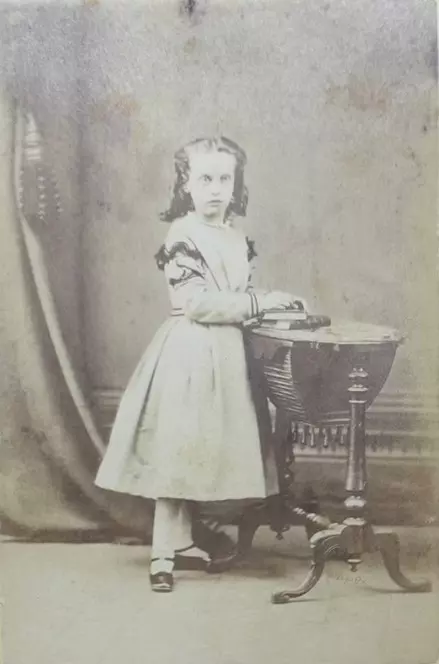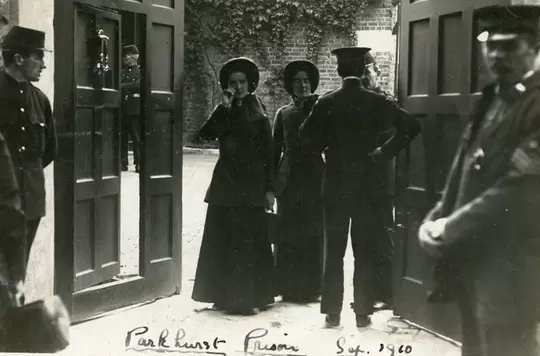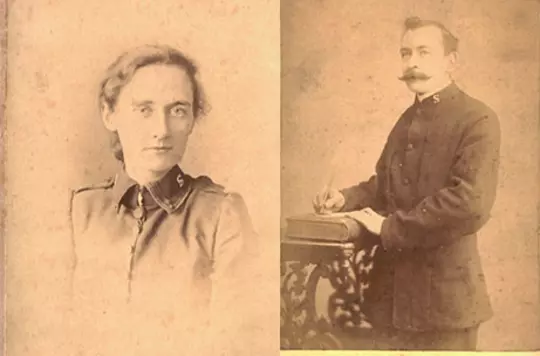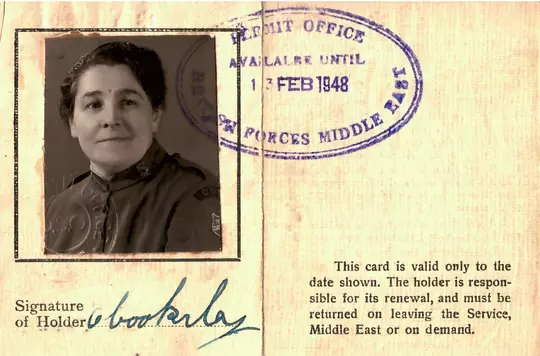International Heritage Centre blog
Marie Booth: the forgotten Booth daughter
Marie Booth: the forgotten Booth daughter
Five weeks into my internship at the Salvation Army’s International Heritage Centre, it occurred to me that, despite getting to know the Booth family through the hundred plus letters I had read whilst cataloguing the Booth-Clibborn collection, I had yet to come across anything about William and Catherine’s sixth child, Marie.
Anyone wanting to learn about Marie will struggle to find more than the basic facts about her life in publications on the Booth family, as Marie led a largely private life, and its details are hidden away in letters, diaries, and documents within the International Heritage Centre and other archives. The omission of Marie in the family’s correspondence aroused my curiosity about her and the life she led, so I did some digging in the archives to find out more about this forgotten Booth daughter.

Marie’s Disability
Born Marian Billups Booth in Leeds on 19th May 1864, Catherine Booth recalled her daughter Marie as a healthy baby until 10 months old when a series of seizures permanently damaged her ‘body and mind’, leaving her ‘in every way an invalid’ but being ‘fully able to apprehend and discharge the main duties of life’. However, the exact nature and extent of Marie’s disabilities are unclear, and I found evidence that this may be the consequence of an intentionally hazy narrative promoted by the Booth family. In a letter to her sister-in-law Florence in 1932, Marie’s sister Katie wrote ‘I received your two telegrams asking me not to state that darling Marie was simple-minded. I am writing him that the weakness came on after smallpox, which they did not know how to treat in those days’. Presumably, Florence and Katie felt it was important to promote the view that Marie’s disabilities were the consequence of a childhood illness rather than an inherited condition. The few letters I found which were written by Marie better inform our understanding of the extent of her abilities. They reveal a proficiency in handwriting, grammar and spelling that suggest her fine motor skills were intact, and that she had a certain level of education. It is only the style of her prose that hints at a mental capacity younger than her years. A letter from 1914 also gives insight into Marie’s capabilities at that time. Katie Booth writes to her sister Lucy that she has seen a decline in both Marie’s memory and in her ability to arrange things for herself, but she adds, ‘on the other hand, she seems quite wide awake to what she wants and says some very sharp and clever things’.

Caring for Marie
Publications on the Booth family agree Marie was cared for in a home environment throughout her life, and I found no evidence to suggest otherwise. William Booth made financial provision for Marie’s care when he died in 1912, and this was supplemented by a payment from the General’s private fund during the 1930s. Whilst her family members are usually attributed to providing the care Marie required, I found evidence that from 1912, at least, the practical aspects of care fell to other Salvation Army Officers who were presumably paid for their work. In Marie’s final years it was her youngest sister, Lucy, who had the responsibility for her care, and it was Lucy who was with Marie when she died on 5th January 1937.
Marie’s Love of Children
Marie was described by her mother as being ‘passionately fond’ of children ‘with whom she felt quite at home’, and there is evidence of this in the archive. For example, in 1891 Emma Booth writes to her sister Katie of her fears that Marie is lonely, suggesting Marie be ‘removed immediately to join [Katie’s] little ones [where] she will then be happy’. The following year William Booth writes to his daughter Katie and tells her that Marie had ‘just returned from a stay at the seaside with Emma’s children’. Furthermore, in a letter from Marie to her brother Bramwell in 1913 she states that she is ‘doing what I can in helping to care for the babies at Brent House [a Salvation Army Rescue Home]’, and soon after Katie writes to Lucy agreeing that the present arrangement for Marie ‘gives her the desire of her heart that she is both able to help the little children and to be nearer to them’. However, I also found evidence that Marie was infantilised by her family. On 28 December 1886 Florence Booth’s diary entry includes the 22-year-old Marie in a list of children who attended a Christmas party, and Katie’s letter to Florence in 1932 refers to the 68-year-old Marie as ‘a dear sweet girl’. It is, therefore, possible that her family’s childlike perception of her influenced Marie’s interests in this regard.

‘Blow your own trumpet’
There was one statement which I found particularly enlightening as to how Marie’s siblings viewed her place in their family. It was in a letter from Katie to her sister Eva in 1935. Katie writes ‘There are only four of us left out of eight children, (because dear Marie cannot be counted for practical purposes)’. I wonder if Marie knew she was not ‘counted’ as a Booth sibling. One statement in the letter she writes to Bramwell in 1913 indicates that she may have recognised their perceptions of her inferiority. After telling him about her help to care for the babies in Brent House, Marie writes:
‘I think by so doing the officers of that establishment find me very useful & appreciate me being amongst them. But I suppose that is for others to say, only it is necessary to blow your own trumpet sometimes for I expect you dont hear much about me or my good qualities’.
There may be more still to uncover about Marie in the International Heritage Centre archive, and I hope that as we further understand her and the life she led, she has some help to blow that trumpet.
Laura
August 2023
Read other blogs from the International Heritage Centre

'The only religious body which has always some of its members in gaol'
Find out about the history of The Salvation Army's prison service, which goes back to 1883...

Love Across the Sea
Take a look at some of the letters Brigadier Frederick Cox wrote to his wife while he travelled the world with William Booth.

Women’s History Month 2023: Salvation Army Women in Egypt.
Catch-up on this years' Women's History Month exhibition with this blog post about Salvation Army women in Egypt.

‘Evangelical Thrust’: The Salvation Army in the New Towns
In the 20th century the landscape of Britain's towns and cities began to change and the architecture of Salvation Army halls changed with them.